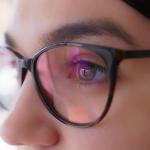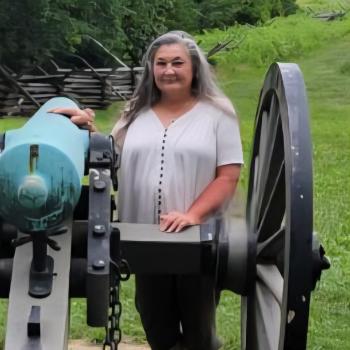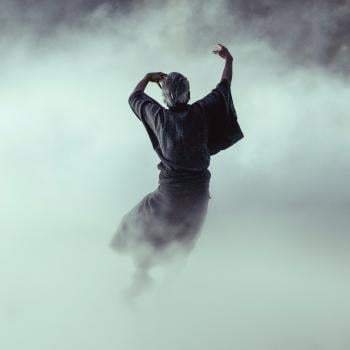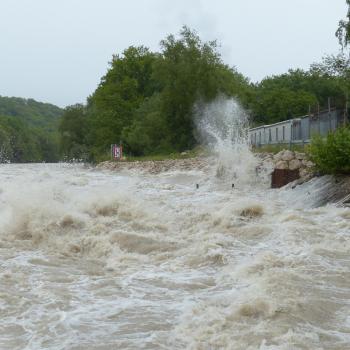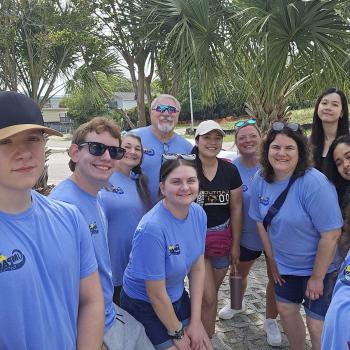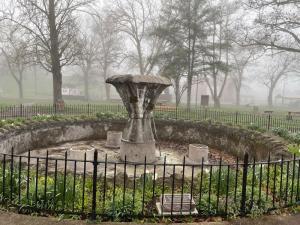
The Fountain In the Park
I was in the city park last week and stopped by the fountain located beside one of the cement walkways that meander through it. Every time I go there, I take pictures. It just seems like the thing to do. You see, this fountain is part of the legacy of my family. My great-grandfather built that fountain in 1935. His first name was Girolamo, but when he came to the United States, he was “given” the name “Jerome.” Not many people remember him now, but he was an artist, a stone mason from Italy. I wanted the world to know his story, so I wrote it as fiction, but it is, indeed, biographical, embellished just a little to fit the plot of the book. The following is a portion of Carry My Tears: Isaiah Speaks (Beverly R. Green, Ichthus Publications, 2019, and Carry My Tears: Anthology, Xulon Press, 2023):
Girolamo’s Story
Building the Fountain
Isaiah looked up toward the fountain, and there was the elderly immigrant Girolamo with his tools of trade, bending over a partially built form that looked like a stone vase.
“Whatta you think? Is agonna be preetty, eh?” the old Italian smiled.
Isaiah, a young boy again, asked, “What’s it gonna be?”
“Is agonna come up lika dees,” Girolamo made a circle with his hands and raised them making the circle wider and wider as they rose. “Water will come out the top like a spreeng anda make a pool atta the bottom; feesh willa sweem in the pool. It willa look anda sound cool onna the hotta days anda peaceful inna the evenings.”
“That’s nifty, Girolamo! How’d you learn to do that stuff?”
“I wenta to school inna Florence. That’s far away, inna Eetaly where I leeved when I was a boy. I looooved to work witha the stones, to carve-a the saints anda the bee-oo-tee-ful angels,” he sighed, “anda to be a sculptor.”
“Is that where you’re from, Florence?”
“No. My family, they have a farm inna Gambugliano. I worked onna the farm and saved my money unteel I coulda go to the school. My mama anda my papa, they were notta so happy weetha me,” he laughed a little. “Your mama anda papa always happy witha you deceesions, huh?”
Isaiah shrugged.
“Wella, you try not to maka you mama and papa sad weetha you.”
“We don’t get to learn stuff like that in school,” Isaiah meant working with stone.
“Ah, it was an arta school. I wanted so bad to learna to makea the sculpture. I woulda maka the marble sooo smooth, and then my teacher, he woulda take the cheesel and tap-tap, tap-tap, anda make eet rough again.”
“Why would he do that, Girolamo?” Isaiah was picturing a large, intimidating man coming around and breaking up his students’ hard work.
“It hada to be. When the stone issa too smooth, it weela not hold up to the weather outaside. The rougha stone issa stronger; eet lasta longer.” He stopped working and looked at Isaiah. “Life, it issa lika that, too, boy. Iffa we have a time too smooth, we breaka down when the storm come. You remember that.”
Those words of wisdom never left Isaiah. He thought about them many times after his parents were killed in the accident. It had been terrible, but it certainly did make him grow up, and more important, it pointed him to a personal relationship with Christ.
“So how come you came to America?” Isaiah asked.
Coming to America
“School issa expensive. I wassa gonna have to queet anda go back-a to the farm, but I got a letter from my relatives inna Illinois, Lock-a-port. There wassa a new church being built anda the preista, he wanna me to come and builda hees bell tower. They said it woulda take about two years, then I coulda return to school. So I booked a passage in steerage on the Cashamere, a bigga boat. I sailed from Napoli weeth my brother Gildo inna March. It wassa soooo cold! We laughed about being in steerage because the people inna first and second class, they kinda looka down on us, but witha almost a thousand peoples in the quarters at night, we stayeda pretty warm, you know,” he laughed.
“How much did it cost to come to America?”
“Me and Gildo, we gotta our teekets for twenty-five dollars each. They mada sure we had a leettle more money to breeng with us to pay for our railroad teekets when we gotta to Amedica, for wherever we were going then.”
“Were you scared?”
“Scared? No. Butta I always thought I woulda be going back. Iffa I realized I woulda be here for the rest offa my life, I would have tried to remember theengs a leetle better. I woulda have hugged my mama and papa a leetle more.”
“Why didn’t you go back?”
“I thoughta I would. I worka my two years anda I feenish the bell tower. I tella my landlady one night that I wassa gonna book my train the nexta day, and she begga me to stay just a leetle longer. She say I needa to rest. I had money inna my pocket anda I hadda made a lot of friends, so I say, ‘OK,’ I would-a stay a leetle longer. Then, ohhh my, my, her granddaughters came to veesit. They were bee-oo-tee-ful. One-a granddaughter, Lucia Franscesco, wanted to get married . . . hahaha . . . how coulda I deesappoint her, eh? I am a gentleman, so I saida, ‘Sure, butta we gotta move to somewhere not so cold.’ She agreed. So we comma here where they were-a building the meell houses weetha stone foundations, anda now here I am, an Amedican!”
“Isaiah!” It was his mother and she did not sound happy. “Isaiah, I’ve been looking all over for you! It’s dinner time!”
“You go onna to deener. Hugga you mama.” Girolamo tipped his hat to the irritated woman.
“Yes, Sir.” Isaiah ran to where his mother stood waiting, and as they turned to walk away she popped him on the bottom with her hand. It stung and it embarrassed him, but he figured he had it coming.
Girolamo, who was still watching, chuckled and went back to his work.
* * *
Isaiah cut through the park. He stopped at the fountain to enjoy the happy trickle and burble sound of the water. In the light from the lamps that stood on poles in the park, diffused somewhat by the leaves of trees that lined the walkway, he could just barely make out the shapes of large, gold and white fish suspended in the water resting, their metabolism slowed for the night, unaware of his presence. What amazing grace God has extended to his creatures that all have a time to rest from their labor. Those very fish would soon go to the bottom of the pool and the water above would freeze and remain that way all winter, but miraculously when spring arrived and the water thawed, those same fish would be there, bigger than before, and with babies! It was a miracle.
Again, Isaiah thought of Girolamo, as he often did when he stopped at the fountain. He pictured him as he saw him last, elderly and suffering from silicosis. He no longer had the strength he once had, but his spirit had not diminished. He was walking down a snow-covered street on a bitterly cold afternoon . . .
* * *
A Tale From My Grandma
“Ah, my young friend!” Girolamo patted Isaiah on the back with a woolen glove that was full of holes.
“How are you, Girolamo?”
“Letta me tell you, I started froma my home today a poor man. There is notta much work for a stonemason thees time of year anda my family issa hungry. I wassa walking past the post office and happened to look into a pile of dirty snow where the shovels hadda pushed it away to the curb, anda I see sometheeng poking out. I reach-a down and peek it up. I could notta believe-a my eyes. Eet wassa twenty dollar bill! Twenty dollars! I looka up the street–nobody there. I looka down the street–nobody there. Eet was like a geeft froma heaven. That willa buy enough groceries to make eet teela my nexta job. Believe-a me, Boy, when eet look-a like there eesn’t any hope, there issa always hope.” He started to cough then, but when it subsided, he looked Isaiah straight in the eyes and repeated, “ always hope. Got bless you, my young friend. You always carry the tears offa the Master.”
“God bless you, Girolamo,” Isaiah answered, wondering at his words.
A Memorial
Girolamo died the following spring of the silicosis, but Isaiah’s parents and their pastor’s family made sure that his family never did without. Isaiah accompanied his father on many missions to their front porch where his father would place a bag of groceries by the door, then slip away while Isaiah rang the doorbell and sprinted down the steps to hide in the bushes, or his mother would send him quietly up to the mailbox to anonymously deliver an envelope with a little cash. Eventually, Girolamo’s children grew up and had families of their own, Lucia passed away, and the life of the town went on. Much of what he built was torn down, but the fountain remained, spilling its cool, peaceful shower over the edge of the vase and into the fish-filled pool around the base, a memorial to a soft-spoken, gentle, faithful man.
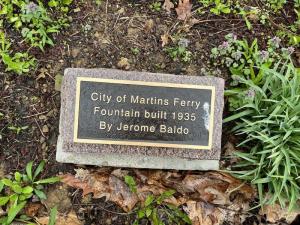
The Legacy
Jerome and Lucia had four children: Amedico, Emma, Anna, and Olga. Olga was my grandmother.
If one were to travel to Lockport, Illinois, he could still see the bell tower built by Jerome Baldo. The fountain in the park still stands and pumps a glistening spray heavenward three seasons a year. There are stone walls, most notably on Colerain Pike in Martins Ferry, Ohio, that he constructed by hand. In the cemetery overlooking the town, there are grave ornaments that he fashioned, including a flower pot that one may see at the gravesite of Lucia Baldo.
The teaching of the wise is a fountain of life, To turn aside from the snares of death (Prov. 13:14).


